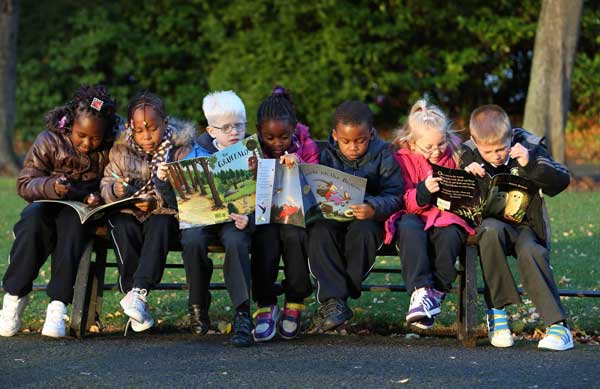Programme Identifies How to Improve Children’s Literacy in Disadvantaged Communities
Resource type: News
Childhood Development Initiative | [ View Original Source (opens in new window) ]
A major research programme has identified an effective approach to improve children’s literacy in disadvantaged communities – and recommended this approach become available to other communities wanting to improve early childhood literacy.
Launching the Evaluation Report of Doodle Den, a children’s literacy programme run in Tallaght West from 2008-2011, the Childhood Development Initiative (CDI) said that the pilot service had improved word recognition, sentence structure, and word choice among the children who took part.
> Download the Evaluation Report (PDF)
It also led to improved concentration, reduced problem behaviours in school, an increase in family library activity and an increase in the child’s reading at home.

Doodle Den participants at Tallaght West.
Doodle Den was trialed as an after-school literacy service in six schools in Tallaght West and involved seven groups of fifteen Senior Infant children participating in three 90 minute sessions a week. It also included six parent sessions and three family sessions per year.
The programme placed an emphasis on learning through games and fun activities and was carefully evaluated to measure its impact.
464 children, 472 teachers and 197 parents participated in the trial over three years and it was independently evaluated by the Centre for Effective Education at Queen’s University Belfast.
The cost of the intensive programme for 15 children for one year was €25,262.
CDI Chief Executive Marian Quinn said given the clear results of the evaluation, Doodle Den should become part of a menu of evidence based after-school programmes for children across Ireland, particularly in disadvantaged areas.
“Doodle Den offers a real opportunity to give children a good start in life. Literacy is a core life skill, without which later chances of full employment, and active citizenship are greatly reduced.”
Wider recommendations in the evaluation findings include:
- That all Government Departments commit to using evidence to inform planning and service delivery. Implementing evidence-based programmes such as Doodle Den is an important step in this commitment;
- That all services for children are evaluated, and those services and models which have no demonstrable impact on outcomes for children are incrementally removed and replaced with evidence-based programmes;
- Pre-service training for professionals working with children includes mandatory modules on engaging parents.
Given its success Doodle Den was this summer already extended in Tallaght for a further year and expanded to three new schools in Limerick under the School Completion Programme. 140 children will benefit from the programme over the coming year.
“We are very pleased with the progress made in integrating Doodle Den into School Completion Programme in Tallaght and Limerick, whilst also recognising that we have some way to go before ensuring that Doodle Den is an option for children in all parts of the country,” Ms Quinn said.
CDI has worked in the community in Tallaght West since 2007 and in that time more than 2,000 children have participated in its eight programmes, of which Doodle Den is one.
CDI is one of three Prevention and Early Intervention Programme organisations, jointly funded by the Department of Children and Youth Affairs and Atlantic Philanthropies. The Prevention and Early Intervention Programme explores new methods for improving outcomes for children in an integrated way, with a fund of €36 million.
Tallaght West Childhood Development Initiative is an Atlantic grantee.